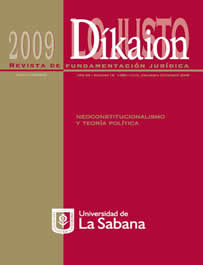Neoconstitutionalism and Practical Reasonableness (Theoretical Framework for a Proposed Master in Constitutional Law)
Keywords:
Constitutional law, neoconstitutionalism, practical reasoning, constitutional justice, fundamental rights.Abstract
This article presents the transformations experienced by Colombian law due to the so-called neoconstitutionalism, from a perspective that seeks to draw both its positive and problematic aspects. In essence they are four: first, an order of values projected on the entire legal system and that, somehow, “materialize” social life and the objective requirements of human dignity. Second, an innovative legal and institutional strength of the Constitution, with direct application of its rules. Third, a revitalization of juridical interpretation, which requires further rational coordinates. Finally, the emergence of new problems related with the legitimacy of the arguments of constitutional decisions. Within this context, it attempts to show the essential guidelines to support a proposal for a graduate academic education in Constitutional Law, highlighting the importance of organizing such proposal from the coordinates of practical reasoning and interpretation. In this sense, the text is part of the theoretical justification for a Master in Constitutional Law, vis a vis the legal and political situation in Colombia.
Downloads
How to Cite
Issue
Section
License
1. Proposed Policy for Journals That Offer Open Access
Authors who publish with this journal agree to the following terms:
This journal and its papers are published with the Creative Commons License Attribution-NonCommercial-NoDerivatives 4.0 International (CC BY-NC-ND 4.0). You are free to share copy and redistribute the material in any medium or format if you: give appropriate credit, provide a link to the license, and indicate if changes were made; don’t use our material for commercial purposes; don’t remix, transform, or build upon the material.






